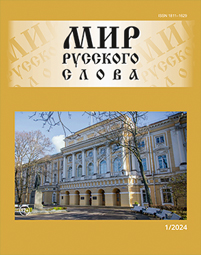Creating a Reasoning Text within the Framework of an Online Discussion
DOI:
https://doi.org/10.21638/spbu30.2024.111Abstract
The article is devoted to the creation of a reasoning text in the process of organizing and conducting an online discussion in a foreign audience in Russian as a foreign language classes using the tools of the MS Teams online platform. The basic principles of working with the group are shown by the example of a discussion-dispute on the popular topic of “Professional burnout in the age of online learning”. Within the framework of the lesson, several stages are highlighted, their features are described in a similar way, the functional and semantic types of speech are indicated, which are being worked on at each stage (explanation, argumentation, instructions). It describes the part of the functionality of the MS Teams online platform that best meets the tasks of working with a foreign audience, and provides examples of effective use of such tools. Different options for structuring each stage of the lesson are considered. The educational potential of role-playing games is demonstrated, and scenarios for their construction of varying degrees of complexity are proposed. The article is applied in nature and aims to disseminate the experience of effective teaching of the creation of a reasoning text by the example of working with foreign students who speak Russian at the B1+ level, as part of ethnically mixed groups. The work is based on a textual typology developed by the staff of the Department of Russian Language and Teaching Methods of St. Petersburg State University by K. A. Rogova, D. V. Kolesova, T. I. Popova, O. V. Khorokhordina, N. V. Shkurina, I. M. Voznesenskaya and I. A. Gonchar and is implemented within the framework of a communicative activity approach. The authors propose to the teaching community another way of teaching the functional and semantic types of speech using modern technical education and achievements of methodological science.
Keywords:
online discussion, discussion-dispute, text-reasoning, argumentative text, text-explanation, text-instruction
Downloads
References
Downloads
Published
How to Cite
Issue
Section
License
Articles of "The World of Russian Word" are open access distributed under the terms of the License Agreement with Saint Petersburg State University, which permits to the authors unrestricted distribution and self-archiving free of charge.




